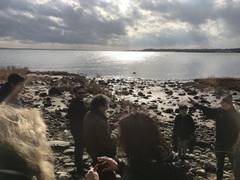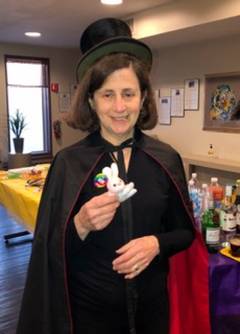B'reishit 5779: Fallen Angels
10/07/2018 02:32:59 PM
| Author | |
| Date Added | |
| Automatically create summary | |
| Summary |
However, I always understood this kind of mythology that features intensive divine-human interaction to not be a feature of the Judaism that I also loved growing up. Judaism, of course, is monotheistic, believing in only one God who speaks and interacts with human beings, but not in the same way that the ancient Greeks of Egyptians or Babylonians believed that their panoply of gods did. Indeed, the Torah primarily focuses on the all-too-human story of the people Israel, not on the occurrences of the supernal realms. Indeed, compared to other ancient Near Eastern writing, the Torah tends to demythologize similar material, putting it in human terms. As Abraham Joshua Heschel taught, âthe Bible is primarily not [humanity's] vision of God, but God's vision of [humanity]. The Bible is not [humanity's] theology but God's anthropology, dealing with [humanity] and what [God] asks of [them].â
But this morning, as we read the beginning of the Torah, we encounter a peculiar passage that challenges this picture of the Torah and how it is distinctive from other ancient religious documents. Toward the end of the Torah reading, we get the genealogy of the generations between Adam and Noah, and then the beginning of the story of the Flood, which will continue next week in Parashat Noah. But stuck in the middle of this otherwise coherent narrative is the following peculiar passage:
â1 Then it happened, as humans began to proliferate throughout the world, and daughters were born to them, 2 that divine beings saw the human girls, and noticed that they were beautiful. They married them as wivesâ"whichever ones they chose. 3 Then YHWH said, âThe life-breath I bestow will not dwell in a human forever, insofar as they, too, are flesh; a human's time will be one hundred and twenty years.â 4 The fallen giants were on earth in those days, and afterwards, tooâ"when divine beings had relations with human women, who bore their offspring. These giants were the mighty ones of old, men of fame. (Genesis 6.1-4, Ben Sommer's translation).â
What are we to make of this cryptic story? Is the Torah really trying to tell us that some kind of divine beings mated with human women, creating a race of giants, the Nephilim? While there are other stories in Genesis and the Bible of angels interacting with human beings, we have no other story like this, which seems to fit more with ancient Greek myth than the rest of the Torah. My teacher Benjamin Sommer, who teaches Bible at JTS, suggests that this passage, reminiscent of ancient polytheistic myths, was included in the Torah precisely to emphasize how the Torah's conception of God different from that of its surrounding cultures. âGod decrees that mixing of this sort should not occur, and that humans…cannot live forever… Humans are made in the image of God... But they are not divine, and a core idea of biblical literature is that God is utterly unique,â Prof. Sommer suggests. âOne way,â he continues, that âthe Torah emphasizes this idea is by reminding its audience of stories from the ancient world that portray a mixing of divine and human realms, and then introducing a crucial difference. â
That crucial difference is that, unlike in those other cultures, the divine and human realms remain separate and distinct. Gods do not become human, and humans do not become divine. The Torah's first audience would have been familiar with those other cultures that imagined much more fluidity between the human and divine realms. This story might have served to reject that notion.
As Professor Sommer suggests, the Torah's âancient audience that they may have heard tales about sexual contact between the heavenly and earthly realms, but this does not change the fact that humans are mortal...Similarly,â he continues, âthe giants the audience had heard about may have once existed, but they are in fact mortal beings and not really comparable to God…This passage, in short, reminds us of the mixing between divine and human realms in order to emphasize that in the end, those realms remain separate.â
This is all well and good, and may explain what this remnant of a mythological story is doing in the Torah. But what did our rabbis, reading it a thousand years after it was first written down, make of this story? How did they square it with their own sense of monotheism? Since it was there in the Torah, they couldn't ignore it or erase it. So their only option was to re-interpret the story to mean something else. And this is mostly what they did.
Rashi, the great medieval exegete, summarizes in his commentary the way most earlier rabbis dealt with the passage. As they do elsewhere in theologically uncomfortable passages, the rabbis understand the word âElohim,â God, as referring to human powers such as judges, rather than to divine powers. This transforms the story into a human story about the corruption that prompted God to bring the Flood. As Rashi explains, these high-status sons of power and privilege would pick whichever women they wanted and forcibly have sex with them, even if they were on their way to be married to someone else. This fits with the picture of violent depravity that is the setting for the Noah story, and helps this passage cohere with what comes before and after it. One early rabbi, Shimon Bar Yochai, went so far as to curse anyone who said this passage refers to divine beings rather than the human sons of judges or noblemen (Bereshit Rabbah 26:6).
But the rabbis were unable to totally suppress the mythical thrust of this passage. Even Rashi mentions it as an alternative interpretation. Furthermore, it shows up in great detail in an 8th century midrashic text, Pirkei de'Rebbe Eliezer. This midrashic work, according to Dr. Rachel Adelman, who teaches at Hebrew College in Boston, represents a âreturn of the repressed â. In this work, narratives and interpretations of the Bible that had been in circulation during the Second Temple period, and which had been ignored or suppressed by the rabbis, unexpectedly turn up in a text within the canon of rabbinic literature.
As Pirkei de'Rebbe Eliezer tells it, then, the descendants of Cain engaged in all kinds of lewdness and sexual immorality. This, in turn, allured the fallen angels, who cohabited with the human women. A race of giants is born from these unions, who then perpetuate the violence that leads to the flood. In sum, this retelling of our Torah passage produces, in Dr. Adelman's words, âa Jewish version of a supernatural myth filled with giants, demigods, and irresistible seductresses.â
So what are we to make of this? First of all, it's just interesting that this exists at all, both in its version in the Torah, and in its version in Pirkei de'Rebbe Eliezer that preserves the supernatural interpretation. Our religion is ancient and complex, and contains many different theological ideas. This story represents one of them, not a dominant one, but one that nonetheless exists within the tradition.
Secondly, this story helps us appreciate how decisively the Torah broke with the religious cultures that surrounded it. There are many stories and motifs that it shares with other, more ancient cultures: the story of Noah that we read next week is famously similar to the Epic of Gilgamesh from Babylonian culture. Yet even with all of these similarities, the differences are even more significant. The Torah took material with which its original audience would have been familiar and used it to teach a fundamentally different concept of divinity. Finally, whether you read the story as a human or supernatural drama, it emphasizes sexual immorality as the precursor to the Flood. That is why it is inserted seemingly out of context in the beginning of the story of Noah. Blurring of appropriate boundaries and abuse of power for sexual gain can lead to the kind of lawless, violent world that God sees no other option but to destroy and start over.
As recent events have reminded us, sex and power remain very much intertwined. Too many people, especially but not only women, have experienced harassment and violation that have affected them terribly for the rest of their lives. As the story of Noah reminds us, left unchallenged, a culture where sexual boundaries are routinely violated can have dire consequences. Together, may we work to prevent the next Flood.
B'reishit 5779: Fallen Angels
Genesis 6:1-4
(×) ×Ö·Ö½×Ö°×"Ö´×Ö ×Ö¼Ö´Ö½×Ö¾×"Öµ×-ÖµÖ£× ×"Ö½Ö¸×Ö¸×"Ö¸Ö"× ×ָרֹÖ-×' ×¢Ö·×Ö¾×¤Ö¼Ö°× ÖµÖ£× ×"Ö½Ö¸×Ö²×"Ö¸×Ö¸Ö'×" ×Ö¼×'Ö¸× Ö-×ֹת ×Ö»×Ö¼Ö°×"Ö¥×Ö¼ ×Ö¸×"Ö¶Ö½×× (×') ×Ö·×ִּרְ×Ö¤×Ö¼ ×'Ö°× Öµ×Ö¾×"Ö¸Ö½×Ö±×ֹקִ××Ö ×ֶת־×'Ö¼Ö°× Ö£×ֹת ×"Ö¸Ö½×Ö¸×"Ö¸Ö"× ×Ö¼Ö´Ö¥× ×Ö¹×'Ö¹Ö-ת ×"ÖµÖ'× Ö¼Ö¸×" ×Ö·×ִּקְ×-Ö¤×Ö¼ ×Ö¸×"Ö¶×Ö × Ö¸×©×Ö´Ö"×× ×Ö´×Ö¼Ö¹Ö-× ×ֲש×ֶ֥ר ×'Ö¼Ö¸×-ָֽר×Ö¼× (×') ×Ö·×Ö¼Ö¹Ö£××ֶר ×"' ×Ö¹Ö½×Ö¾×Ö¸×"Ö¨×Ö¹× ×¨×Ö¼×-Ö´Ö¤× ×'Ö¸Ö½×Ö¸×"Ö¸×Ö ×Ö°×¢Ö¹×Ö¸Ö"× ×'ְּש×Ö·×'Ö¼Ö·Ö-× ×"Ö£×Ö¼× ×'ָש×Ö¸Ö'ר ×Ö°×"Ö¸×Ö£×Ö¼ ×Ö¸×Ö¸Ö"×× ×Öµ×Ö¸Ö¥×" ×ְעֶש×ְרִÖ-×× ×©×Ö¸× Ö¸Ö½×"× (×") ×"Ö·× Ö¼Ö°×¤Ö´×Ö´Ö×× ×"Ö¸×Ö£×Ö¼ ×'Ö¸×ָרֶץ֮ ×'Ö¼Ö·×Ö¼Ö¸×Ö´Ö£×× ×"Ö¸×"Öµ×Ö' ×Ö°×'Ö·Ö£× ×Ö·Ö½×-ֲרֵ×Ö¾×ÖµÖ-× ×ֲש×ֶ֨ר ×Ö¸×'Ö¹Ö××Ö¼ ×'Ö¼Ö°× ÖµÖ¤× ×"Ö¸Ö½×Ö±×ֹקִ××Ö ×Ö¶×Ö¾×'Ö¼Ö°× Ö£×ֹת ×"Ö½Ö¸×Ö¸×"Ö¸Ö"× ×Ö°×Ö¸×Ö°×"Ö-×Ö¼ ×Ö¸×"Ö¶Ö'× ×"ÖµÖ§×Ö¼Ö¸×" ×"Ö·×'Ö¼Ö´×'ֹּרִÖ×× ×ֲש×ֶ֥ר ×Öµ×¢×Ö¹×Ö¸Ö-× ×Ö·× Ö°×©×ÖµÖ¥× ×"ַש×Ö¼ÖµÖ½×× (פ)
1 Then it happened, as humans began to proliferate throughout the world, and daughters were born to them, 2 that divine beings saw the human girls, and noticed that they were beautiful. They married them as wivesâ"whichever ones they chose. 3 Then YHWH said, âThe life-breath I bestow will not dwell in a human forever, insofar as they, too, are flesh; a human's time will be one hundred and twenty years.â 4 The fallen giants were on earth in those days, and afterwards, tooâ"when divine beings had relations with human women, who bore their offspring. These giants were the mighty ones of old, men of fame.
Rashi on Genesis 6:2
(×) ×'× × ×"××ק××. ×'Ö¼Ö°× Öµ× ×"ַש×ָּרִ×× ×Ö°×"ַש×Ö¼×ֹפְ×Ö´××. ×"Ö¼Ö¸×'ָר ×Ö·×-ֵר ×'Ö¼Ö°× Öµ× ×"Ö¸×Ö±×ֹקִ××, ×"Öµ× ×"ַש×ָּרִ×× ×"Ö·×"×Ö¹×Ö°×Ö´×× ×'ִּש×Ö°×Ö´××-×ּת×Ö¹ ש×Ö¶× ×ָק×Ö¹×, ×Ö·×£ ×"Öµ× ×"Ö¸××Ö¼ ×ִתְעָרְ×'Ö´×× ×'Ö¼Ö¸×"Ö¶×; ×Ö¼Ö¸× ×Ö±×ֹקִ×× ×©×Ö¶×'Ö¼Ö·×Ö¼Ö´×§Ö°×¨Ö¸× ×ְש××Ö¹× ×ָר×ּת...(×') ×× ××'ת ×"× ×". ×Ö¸×ַר רַ×'Ö¼Ö´× ××Ö¼×"Ö¸× ××'ת ×ְּתִ××', ×ְּש×Ö¶×"Ö¸××Ö¼ ×Ö°×Ö´××'Ö´×× ××ֹתָ×"Ö¼ ×ְקֻש×Ö¼Ö¶×ֶת ×Ö´×Ö¼Ö¸× Öµ×¡ ×Ö·×-ֻפָּ×", ×"Ö¸×Ö¸×" ×'Ö¼Ö¸×"×Ö¹× × Ö´×Ö°× Ö¸×¡ ×Ö¼×'×Ö¹×¢Ö²×Ö¸×"Ö¼ תְּ×-Ö´×Ö¼Ö¸×" (×'ר×ש×ת ר×'×"): (×') ××× ×שר ×'×-ר×. ×Ö·×£ ×'Ö¼Ö°×¢×Ö¼×ַת ×'Ö¼Ö·×¢Ö·×, ×Ö·×£ ×"Ö·×-Ö¼Ö¸×ָר ×Ö°×"Ö·×'Ö¼Ö°×"Öµ×Ö¸×":
(1) THE SONS OF ELOHIM â" The sons of princes and rulers (Genesis Rabbah 26:15). Another explanation of "Sons of Elohim:" these were princely angels who came as messengers from God: they, too, intermingled with them (the daughters of men). Wherever the word ×××"×× occurs in the Scriptures it signifies authority...
(2)THAT THEY WERE FAIR â" Rabbi Yudan said, âIt is written here tovat, for when they were being made to appear âgoodâ by being decked out to be taken beneath the marriage canopy, one of the lords would come and carry her off first (Genesis Rabbah 26:5).
(3) OF ALL WHOM THEY CHOOSE â" even if it were a married woman or a man or an animal (Genesis Rabbah 26:5).
Pirkei DeRabbi Eliezer 22
(×') ר×'× ×××ר ×××ר ×'××× ×'שר ער××" ×"×× ×"××××× ×"×ר×ת ×©× ×§×× ×"×× ×©×× ××"× ×©×× ××'×"××" ××××××× ×'×× ×-× ×ת ××ש ×'××× ××'×'×ª× ××'×שת ××-×× ×'××× ×'ר×-××'×ת ×'×צר ×"רע ××'××-ש×'×ת ××'× ×©× ××ר ×××¨× ×"' ×× ×¨×'×" רעת ×"××"× ×'×רץ. (×") ר×'× ×××ר ר×× ×"×××××× ×©× ×¤×× ××ק×× ×§×"××©×ª× ×× ×"ש××' ×ת ×'× ×ת ק×× ××"×××ת ×'××××ת ×'שר ער×××" ××××-××ת ×¢×× ××"× ××-×× ×ת ××ª×¢× ××-ר××"× ××ק×-× ××"× × ×©×× ×©× ××' ××ר×× ×'× × ×"××ק×× ×ת ×'× ×ת ×"××"× ××'×'.(×") ר×'× ××"×שע ×'× ×§×¨×-×" ×××ר...×'שע×" ×©× ×¤×× ×× ×"ש××× ××ק×× ×§×"××©×ª× ××-× ×ק×××ª× ××'× × ××"× ×××'××©× ×'×ש עפר... (×) ר×'× ×¦×"×ק ×××ר ××"× × ×××"× ×"×¢× ×§×× ×"××"×××× ×'×'××'×" ק×××" ××ש××-×× ××"× ×'×× ×'×-× ××-×ס ×שפ×××ת ×"×××...(×) ××ר ××"× × ×- ש××'× ××"ר×××× ×××עש××× ×"רע×' ש×× ××'×× ×¢×××× ×× ×"××'×× ×××ר×ת ×× ×-רע ×'× × ××"×
(3) Rabbi Meir said: The generations of Cain went about stark naked, men and women, just like the beasts, and they defiled themselves with all kinds of immorality, a man with his mother or his daughter, or the wife of his brother, or the wife of his neighbour, in public and in the streets, with evil inclination which is in the thought of their heart, as it is said, "And the Lord saw that the wickedness of man was great in the earth" (Gen. vi. 5).
(4) Rabbi said: The angels who fell from their holy place in heaven saw the daughters of the generations of Cain walking about naked, with their eyes painted like harlots, and they went astray after them, and took wives from among them, as it is said, "And the sons of Elohim saw the daughters of men that they were fair; and they took them wives of all that they chose" (ibid. 2).
(5) Rabbi Joshua said: ... when they fell from heaven, from their holy place, their strength and stature (became) like that of the sons of men, ...
(6) Rabbi Zadok said: From them were born the giants (Anakim), who walked with pride in their heart, and who stretched forth their hand to all (kinds of) robbery and violence, and shedding of blood ...
(9) Noah said to them: Turn from your ways and evil deeds, so that He bring not upon you the waters of the Flood, and destroy all the seed of the children of men.
Sat, November 8 2025
17 Cheshvan 5786
Photo Gallery
Photo Albums
Upcoming Events
-
Friday ,
NovNovember 14 , 2025Give Thanks at Tot Shabbat 2025
Friday, Nov 14th 5:30p to 6:30p
-
Tuesday ,
NovNovember 18 , 2025Women's Rosh Chodesh Group
Tuesday, Nov 18th 12:00p to 1:30p
New Women's Rosh Chodesh Group Tuesdays, 12:00-1:30pm Gather with Cantor Sklar and KTI friends at the start of each month of the Hebrew calendar to learn about the themes and traditions of the coming month. Learn from each other, learn more about each other and better understand the women within our tradition. Enjoy music and lunch together! Please a dairy or parve lunch to enjoy at noon, followed by the discussion at 12:30pm. KTI will provide drinks and dessert. RSVP Appreciated -
Wednesday ,
NovNovember 19 , 2025Rabbi, May I? Modern Responsa
Wednesday, Nov 19th 10:00a to 11:30a
Wednesdays, 10 - 11:30 AM, KTI Library Ever since Abrahamâs famous argument with God, Judaism has been full of debate. Moses and Korah, David and Nathan, Hillel and Shammai, the Vilna Gaon and the Baâal Shem Tov, Spinoza and the Amsterdam Rabbis . . . the list goes on. No wonder that Judaism cherishes the expression machloket lâshem shamayim, âan argument for the sake of heaven.â Beyond their historical importance, what makes these disputations so compelling is that nearly all of them, regardless of their epochs, are still being argued. The parade of characters spanning three millennia of biblical, rabbinic, and modern disputation reflects the panorama of Jewish history with its monumental political, ethical, and spiritual challenges. This series will examine Jewish responses to exile from the biblical period to our modern day. Considering texts from all genres of Jewish literary creativity, we will explore how the realities and iterpretaions Join as we re-open these timeless debates that lead us to the core of 3,000 years of Jewish conversation. ⢠Justice: Abraham vs. God (October 19) ⢠Holiness and Authority: Moses vs. Korah (November 9) ⢠Inclusion: The Five Daughters vs. the Twelve Tribes (November 30) ⢠Accountability and Morality: David vs. Nathan (December 21) ⢠Resistance: Ben Zakkai vs. the Zealots (January 18) ⢠Law: Hillel vs. Shammai (February 15) ⢠Spirituality: The Vilna Gaon vs. the Baal Shem Tov (March 15) ⢠Boundaries: Spinoza vs. the Amsterdam Rabbis (April 19) ⢠Religious Evolution: Geiger vs. Hirsch vs. Frankel (May 10) ⢠Zionism: Herzl vs. Wise (May 31) -
Wednesday ,
NovNovember 19 , 2025Wrestling with God
Wednesday, Nov 19th 8:00p to 9:30p
Wrestling with God Wednesdays, 8-9:30 PM Congregantsâ homes TBA We need to talk about God. And about how we talk, and donât talk, about God. Itâs a big topic, maybe the biggest. This offering invites adult learners into compassionate inquiry, deepening their relationship to Jewish text through collective exploration. Using the album s*ngs ab-ut g?d [https://open.spotify.com/album/6JEY2AN6awAxNfWwmXX460] by Jewish educator Eliana Light as a starting point, this series blends music, Hebrew text study, and open-ended questions to help participants examine their own connections to the divine. This is sacred work. Itâs not about getting it right. Itâs about showing up with curiosity, humility, and a willingness to join the long lineage of Jews who wrestle with God. Each session stands alone, but weâd love to have a consistent group as much as possible. Dates: September 10: skyman October 22: shadows November 19: in the silence December 10: if only January 21: lead me back February 11: three steps March 11: beyONEd April 29: the mountains May 20: the name June 17: I rise -
Thursday ,
NovNovember 20 , 2025Coffee with the Rabbi
Thursday, Nov 20th 8:00a to 9:00a
Start your morning with some caffeine and casual or meaningful conversation! Join Rabbi Goldberg for a Coffee Chat! Stop by Rye Ridge Starbucks any of the following Thursdays, between 8-9am: June 12 and 26 July 10 and 24 August 7 and 21 September 4 and 18 October 16 and 30 November 6 and 20 December 4 and 18
Privacy Settings | Privacy Policy | Member Terms
©2025 All rights reserved. Find out more about ShulCloud






